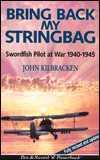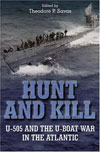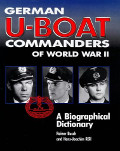Bring Back My Stringbag
Swordfish Pilot at War, 1940-1945
Kilbracken, John
1997, Trans-Atlantic Publications, Inc.
ISBN 0850524954
Paperback, 245 pages, 17 b&w photos, 1 map
| Type. | Memoir |
| Pros. | Mostly interesting first-person account |
| Cons. | Sometimes slow going |
| Rating. |  |
 At first glance and indeed until the last chapter, this book seems to be nothing more than a mildly entertaining upper-class memoir of wartime service. The tone is light-hearted, often flippant, even when recounting near brushes with death. However, the final chapter, which was apparently substantially revised for this edition, is much darker, but is what really makes the book worthwhile.
At first glance and indeed until the last chapter, this book seems to be nothing more than a mildly entertaining upper-class memoir of wartime service. The tone is light-hearted, often flippant, even when recounting near brushes with death. However, the final chapter, which was apparently substantially revised for this edition, is much darker, but is what really makes the book worthwhile.
The author's father, a World War I pilot, was killed in a flight test. This incident did not put Kilbracken off flying; on the contrary, it seemed to be in his blood, as he fell in love with it from his first flight as a passenger at the age of five, as a youth creatively found ways and means to become a qualified pilot and to fly as much as possible, and volunteered for service on the outbreak of World War II.
Some of the most interesting incidents recounted are those which illustrate that the Stringbag could almost qualify as a secret weapon - on two counts, its archaic appearance and its low speed. The latter often tricked the enemy into believing their sophisticated tracking machinery was reading the aircraft's speed incorrectly - nothing could fly that slow. The former often acted as a disguise, leading the enemy to assume that they were friendly training craft - who would go to war in something that looked like that - a biplane with a single engine?
The author tells of his numerous brushes with death, including several engine cut-outs leading to ditching, once in the freezing North Atlantic. The final straw for this experienced pilot was being sprayed with ether from a hydraulics leak in a Barracuda - the newly discovered reason why so many Barras were simply failing to return from missions.
Most of the narrative takes a humorous view of potentially deadly incidents, even the macabre being described rather light-heartedly. In recounting various actions against U-boats and German capital ships, the author mentions more than once that at that time he did not think of the men he was bombing in their boats and ships, although at the end of the book he revisits this topic with more introspection. He does honestly admit his fear of taking command of 835 Squadron, a mixed group of Stringbags (Swordfish IIIs) and Wildcats VIs. However, he rose to the occasion, and even settled a bad morale situation caused by exhaustion and some tension between merchant officers and flying officers.
The last part of the book darkens considerably in tone, when the author reveals that the words "Bring Back My Stringbag" signified to him not just the words of a popular song, but a real, intense, but unfulfillable yearning to abandon the unfamiliar and dangerous Barracuda and return to flying the archaic yet reliable biplane. The contrast between the boy who schemed for flying opportunities, and the grown man who could no longer force himself to enter a cockpit, is somber and striking.
This revised version of Kilbracken's memoir is to be recommended over the original edition. Although it is slow going at times, especially in the first few chapters, in the end the reader's perseverance will be rewarded. Includes an index, and three appendices: one devoted to Wing-Commander Neville Usborne RNAS, the author's father; one summarizing Stringbag history; and the third providing a table of merchant aircraft carriers.
December 9, 2001: Addendum - It is a rare but much-appreciated experience for us to hear from authors whose books we have reviewed. We recently received an email from the author of Bring Back My Stringbag, John Kilbracken, Lt-Cdr (A) RNVR. While he thanked us for reviewing his book, he did note a few errors in the review. We are glad he took the time to set the record straight. Here are his comments:
"(A) It wasn't my father, but my mother's first husband, who was killed on a test flight in l9l6, so my love of flying can't have been inherited from him! - see paras 2 and 6. (B) The tension in HMS Nairana wasn't between merchant officers (there weren't any) and flying officers, but between flying officers and the straight-ringed RN executive officers, who knew nothing about flying and regarded us as little more than a bloody nuisance! - (with the exception, in my opinion, of the Captain)."
Review written by Tonya Allen.
Published on 20 Aug 2000.
Purchase information: (info) Get Bring Back My Stringbag now at amazon.co.uk
Get Bring Back My Stringbag now at amazon.co.uk
Return to our main review page.



